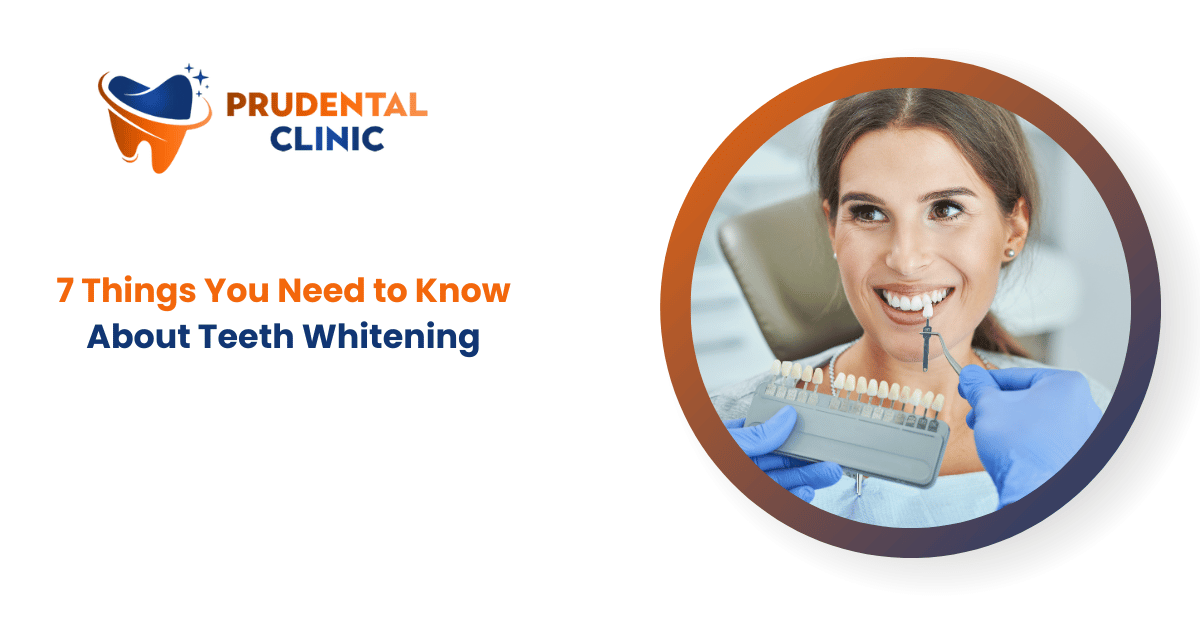When you meet someone, your grin is the first thing they’ll notice. At Prudental Clinic, we get a lot of questions regarding teeth whitening, so we thought it would be a good idea to share seven facts about the process. This blog will go over seven things you should know before getting your teeth whitened.
Top 7 Things You Need to Know About Teeth Whitening
What Causes Tooth Discoloration?
Your teeth may have changed color for a variety of reasons. The color of your teeth can be altered by consuming specific meals and drinks. Teeth can become stained from beverages including red wine, coffee, and tea. The pigments in these drinks can cling to the enamel on your teeth. Tobacco tar and nicotine, respectively, leave brown and yellow streaks.
One more thing: time is a factor. We lose some of our tooth’s protective enamel and see more of the yellowish dentin underneath as we get older.
Antihistamines, antibiotics, blood pressure drugs, and chemotherapy are among the medications that might discolor teeth.
The Process of Teeth Whitening
Hydrogen peroxide and carbamide peroxide are the bleaching agents used in teeth whitening. In order to remove the stains, an oxidation process must occur.
Teeth Whitening At Prudental Clinic
The most effective and secure method of teeth whitening is a professional procedure that can be done in your dentist’s office. You may use a stronger whitening agent under the watchful eye of your dentist. Because these agents could do harm to your gums if exposed to them, we shield them from them. To further improve the treatment, a specialized light or laser might be employed. In as little as 90 minutes, you may whiten your teeth up to 10 shades lighter than before.
In only one visit to Prudental Clinic, we can brighten your teeth numerous shades with teeth whitening. In just one session, our skilled teeth whitening and bleaching treatments can eliminate stains that have built up over the years. You can also think about doing it at home. Bleaching agents, usually administered in trays or strips that adhere to teeth, are available in lesser concentrations. While these products do the trick, they can’t compare to the professional dental care you’d get in a dentist’s office.
Whitening Products for Teeth
While whitening strips and toothpastes are less expensive options, whitening trays can be a more effective way to whiten your teeth. For many weeks, you can whiten your teeth by filling a tray with whitening gel and wearing it for 30 minutes to an entire night.
The trays that come with most over-the-counter whitening kits aren’t comfortable and don’t fit your teeth properly. You can use less gel and have a more comfortable fit with custom-made whitening trays made by your dentist if they provide this service.
Whitening Your Teeth Rinses and Toothpaste
There is no shortage of whitening toothpastes. The gentle abrasives in them work wonders on surface stains. These items are distinct from bleaches since they do not alter the tooth color. The stains on the surface of your teeth are the only ones they help eradicate.
Easy to use, Just replace the toothpaste with your regular one—and inexpensive, whitening toothpastes and rinses are a great option for those who want whiter teeth. But whitening rinses and toothpastes take longer to work and only lighten teeth by a few of shades at most. There are other tooth whitening treatments that produce longer-lasting results, but this one doesn’t.
Not All Teeth Are Whitenable
Bleaching works best on yellow teeth, not so well on brown ones, and maybe even on gray or purple ones. When discoloration results from pharmaceutical side effects or dental damage, whitening solutions may not be effective.
Bleaching works best on yellow teeth, not so well on brown ones, and maybe even on gray or purple ones. When discoloration results from pharmaceutical side effects or dental damage, whitening solutions may not be effective.
Whitening will not affect restorations like crowns, fillings, caps, or veneers.
Possible Negative Reactions to Whitening Your Teeth
Whitening products can cause tooth sensitivity, which is the most prevalent negative effect. When the whitening substance gets under the tooth’s enamel and irritates the pulp chamber, this happens. The impact is temporary, so you can give it another go when it wears off.
Overuse can harm your gums and tooth enamel, so be sure to follow the label guidelines or talk to your dentist before using any at-home products.
Consider Consulting Your Dentist About Teeth Whitening
We recommend that you see your dentist at Prudental Clinic, Dental Clinic in Kothrud, Pune before beginning any teeth whitening procedure. Depending on the state (and shade) of your teeth, your dentist can tell you whether the procedure is worth it. Call +91 88058 86919 if we can be of more assistance or answer any questions you may have.

